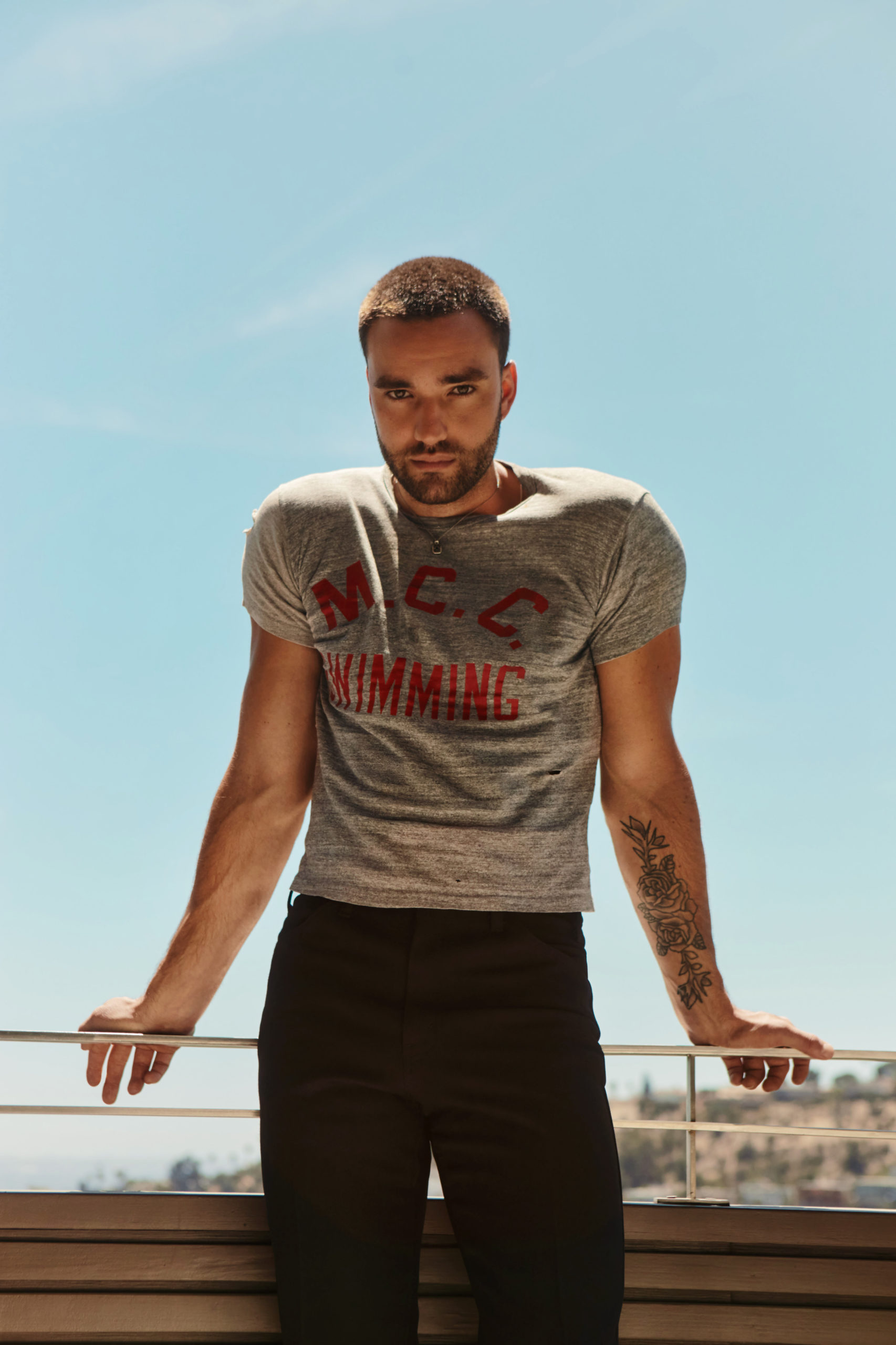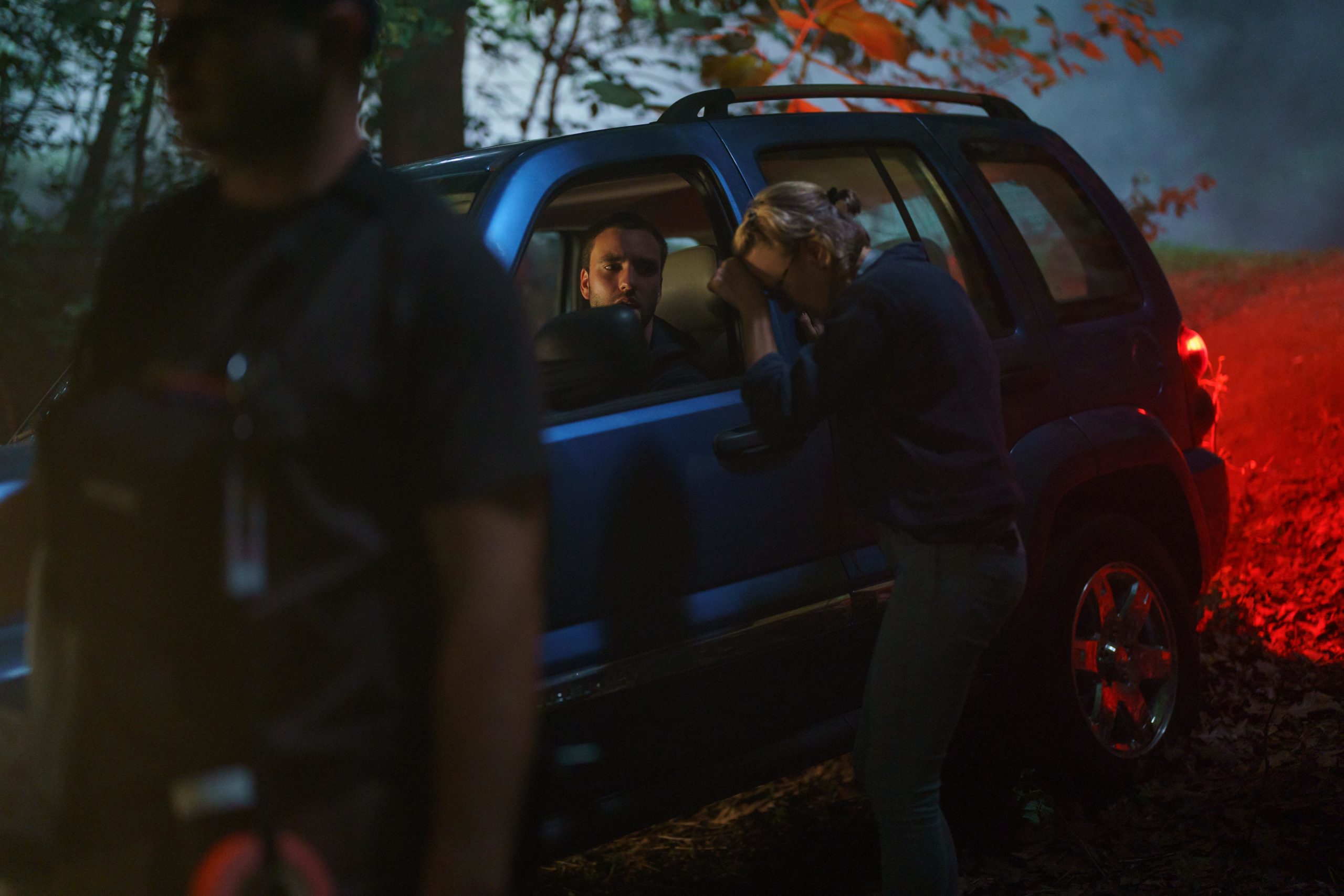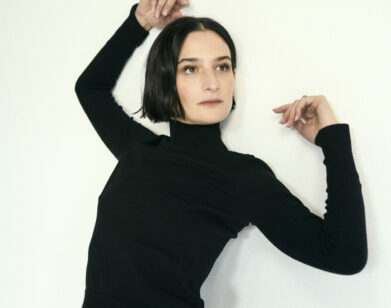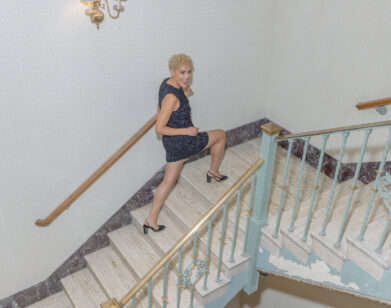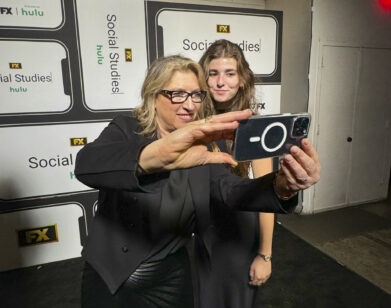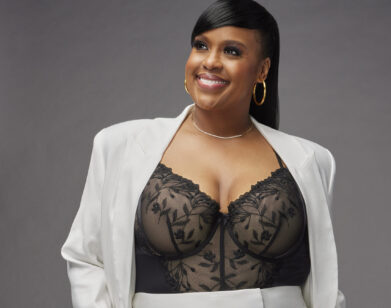LIAR LIAR
Jackson White and Robin Wright on the Weirdest Job in the World
In Hulu’s Tell Me Lies, Jackson White’s performance as the show’s charming but toxic antagonist Stephen is a masterclass in manipulation. Throughout each hour-long episode, White slips from charismatic to casually psychopathic and back again so seamlessly you’re never quite certain what to make of his character, even when you know he’s conning everyone around him. Adapted from the bestselling Carola Lovering novel of the same name, the show dabbles in a bit of mid-aughts nostalgia; sexts are sent on Blackberries and Ugg boots pile up in the corner of sweaty house parties. But the steamy, self-destructive affair at its core feels fresh in a media landscape dominated by period romances and hyper-modern dramas. Ahead of tonight’s premiere of the series’ hotly-anticipated conclusion, White sat down with acclaimed actress and director of the Tell Me Lies finale Robin Wright for a conversation about his musical upbringing, career ambitions, and on-set jitters. —CAITLIN LENT
———
WHITE: Hi, Robin.
WRIGHT: Hey, hey!
WHITE: What’s up? Can you see me?
WRIGHT: Yeah, we don’t need to be on video but I love looking at you anyway. I can turn my video on. I just look like shit.
WHITE: No you don’t!
WRIGHT: [Laughs] Good morning!
WHITE: I’m so happy to be here.
WRIGHT: It’s so great. This is going to be fun. Have you ever done Interview before?
WHITE: No, I haven’t. This is my first time.
WRIGHT: Well look at you, newbie.
WHITE: I know. Lots of firsts.
WRIGHT: The only time I did Interview, Francis Ford Coppola interviewed me.
WHITE: That is intense.
WRIGHT: I know. It was such an honor. Anyway, just reading up on you, you’re a music man. You came from a music family, which I didn’t know about before I met you on the Tell Me Lies set.
WHITE: My mom and dad are both musicians. That’s the core of the family. Dad’s a drummer, Mom’s a singer. It was a musical upbringing.
WRIGHT: When did you start playing an instrument and what instruments did you start playing?
WHITE: When I was a baby. Literally, there’s a picture of me with drumsticks that look like tree trunks. I was probably three years old, taking drum lessons from my dad. This is all trippy because I really still just feel like a drummer. That’s what I was training in from when I was a kid. And then I started picking up instruments and writing songs and I went to school for music, and that’s really what I was going to do, and then the switch happened when I was probably 19 or 20, when I did my first movie.
WRIGHT: How did that switch happen?
WHITE: It happened because my mom’s an actor. I always wanted to act and audition. And she didn’t let me do anything until I was 18, I wasn’t allowed to get an agent or audition or anything. And then I finally started doing it when I was in college. I barely went to college, but when I was there I was auditioning ‘cause I hated school. I’ve always hated school. And even then it was music-based. I was only auditioning for “kid with guitar,” or “band guy three.” Those were my first auditions. I got my first movie writing songs, playing a musician, and then it just transferred over. Being on set, making a movie—that was the discipline and the job that I loved so much. So I started just getting really serious and obsessed with it. And then I just got hooked.
WRIGHT: I was going to be a dancer and then I became an actor. Same thing.
WHITE: Really?
WRIGHT: Dance was my whole life.
WHITE: Wow.
WRIGHT: When you’re studying and preparing for a role, where do you find the connection and the movement and the rhythm that you get from music?
WHITE: Such a good question. It’s the timing. I always loved comedy because it’s all timing, and I always loved reacting to things, because I grew up playing in bands. It’s all a group effort. They say you start with drums and then you can play any instrument, and I feel the same way about acting. I started with drums and so I felt very natural in acting because I was like, “Oh, this is timing. This is waiting for a response and then hitting it right on the beat and finding the rhythm of things and collaborating.” Also, I learn lines while doing rudiments. I sit there and play drums on a pillow or whatever and just recite my lines, and it’s so second nature that I’m just always hitting things and tapping. Now it’s actually really hard for me to not tap and hit my legs and move around. You’ll see that in a lot of—
WRIGHT: I saw it in takes, Jackson. Do you remember that one take—
WHITE: Yes!
WRIGHT: I was like, “Jackson, we already have a take of you shaking your leg when you were sitting in the chair.” I was like, “On this one, just don’t.”
WHITE: Yeah. “Just don’t do that.” I’m literally playing pedals as I’m saying the lines.
WRIGHT: Oh, that’s so sweet. Now I get it. I was like, “If you could stop moving”—
WHITE: It’s my ADD and my drums, and I have to have all my limbs moving. That’s so funny.
WRIGHT: It’s adorable. Just a quick sidebar ’cause I want to know, as everybody else wants to know, why did the role of Steven in Tell Me Lies attract you? That’s an interesting, conflicting person to play. So how does that feel in your body and why’d you take it?
WHITE: I know they wanted me because I’m weird. I’m not doing it by the book, I’m just trying to do it my own way. I was drawn to [Steven] because he’s so internal and I’m so external and I’m such an extrovert, and this dude is so secretive, locked up, and stoic. Men want to be that guy, always. Men want to be the guy that speaks when spoken to and is mysterious. And that’s so much of who he is. And it was a fantasy of mine to play someone who’s holding all the cards and running things. Because in real life, I’m such a puddle. I’m drippy, emotional, and everyone knows what I’m feeling ’cause it’s written all over my face. And this was an exercise in stillness and holding things close to the chest and being reserved in that way. I knew when I read it, the first instinct is to be a villain, because so many of his words are antagonizing and kind of manipulative, and he’s so belittling to Lucy. But I was like, “No, that’s on paper. This guy believes every single thing he’s saying. He’s lying so much that he actually believes what he’s saying.” And the fun part was being as genuine as possible with these really outlandish, crazy things he’s saying, bringing an organic, natural approach towards all that crazy shit. That’s what I fell in love with.
WRIGHT: How great that you did that, because morally, what word would you give him?
WHITE: Questionable. Confusing. He’s really—
WRIGHT: He’s deceitful, but that’s out of his youth, his naïveté, and the power that he feels he needs. It’s fuel for him, no?
WHITE: Yeah, it’s his fuel. He runs on power and feeling like he’s in control. His survival mechanism is to feel like he’s in control.
WRIGHT: So true. What do you feel about this whole show, just as far as living in this world today? You’re in your twenties?
WHITE: Yeah. 26.
WRIGHT: And these kids are in their early twenties.
WHITE: Yeah.
WRIGHT: What do you feel the whole show says about society today with your generation?
WHITE: It makes you think about how we’re treating people. It’s so visceral and real. That’s the difference between this show and a lot of other shows, other character pieces about people this age, is that this is the real dark, gritty version of how bad it can get when we keep secrets and hold all our shit in. And it’s obviously before the social media craze. If this took place during the world of Instagram and TikTok and whatever, these kids would be fucked, these kids would be so outed and there wouldn’t be as much secret-keeping. It’s doing a good job of making people feel introspective, making them think about their own behavior and how they’ve treated people. It’s like a therapy session in 10 episodes, because you’re being reminded of parts of yourself. That’s why the show succeeds.
WRIGHT: I agree. And also, just as a reminder to say, “Oh my God, I did that when I was 20. Oh, I lied about that.” We all did. This is exactly the way girls and boys speak to each other at that age and believe in love in that way. It’s death if you lose something. You literally feel like you’re dying.
WHITE: Yeah. It feels like you’re dying. The anxiety can get so high that you have to put it somewhere. And these kids don’t know how to internalize anything and actually take care of a feeling. They just put it on someone else.
WRIGHT: What was the most challenging part about playing this character?
WHITE: I never had a problem separating myself from him. But the hardest part was the routine of going to the job and putting this guy on and wearing him and holding it all in and then trying to let him go when I went home. It was two different people and it was really challenging. The actual mechanics of making the show were new to me. That was the longest shoot I’ve ever done, for lack of a better phrase, that was the most words I had to say, that was the most work I had to do.
WRIGHT: What do you feel like you learned the most from doing a show where you’re weeks, months in succession? You’re living in a different city. It’s very different from doing a movie, that’s, “Oh hey, it’s a 25 day shoot and then we’re out of here.”
WHITE: Which has been my only experience: one other show where I was working for four months. You learn how to compartmentalize your real emotions and then be on set. It’s the weirdest job in the world.
WRIGHT: I’m just nodding my head, going, “Yep.”
WHITE: That is hard.
WRIGHT: What would you really desire to play that you haven’t yet, or that you hope is coming down the line when you’re hitting 40? Do you have a dream project?
WHITE: These days? I just really want to use my body and run around and learn a sport, learn a skill, do something that involves all of me instead of sitting in a cafe, manipulating somebody. It all ties back to me not being able to sit still. I did my first horror movie last year. I did a Pet Sematary prequel and I was in Montreal and I had to run around and dive into a swamp and tackle people and wrestle dogs. It was nuts. It’s two different breeds of acting. There’s the composed, psychological part and then there’s the part where you just get to be an athlete. That’s so crazy. There’s no other job like that.
WRIGHT: Who inspires you?
WHITE: The obvious answer is my mom. My mom was so put together and she was so professional, but she was also a mom first. And you’re so inspiring ’cause you’ve made such a cool transition, I saw you out with your daughter the other day. You incorporate family. You’re acting, you’re directing, you’re balancing all these things, all these beautiful parts of life. And that’s what I want to do. In my twenties, I’m obsessed with the next role and the next job. And that’s just how it is. You have to get ahead. But my fantasy is to one day have kids, take them to set, travel with them, have a house and animals, and just have a balanced life. That’s so attractive. Being an actor in your twenties is kind of lonely. You go on set. I don’t have a wife and kids, so it’s all about the job. It’s all about the thing. And then you come home and you can’t help but feel empty. I know that sounds depressing, but—
WRIGHT: No, it’s true.
WHITE: Yeah. I look forward to the other parts.
WRIGHT: Yeah, it’s a very isolated craft, being an actor.
WHITE: Talk about that. Yeah, It’s so exciting and glamorous at times. And then, 90% of it is being okay with being in a hotel room and being okay with “go, go, go,” and then dead silence. That’s scary.
WRIGHT: Yeah. It’s the all-or-nothing syndrome. Do you have a motto or a proverb?
WHITE: That’s such a good question. “Give love.” It’s so easy to let my ego convince me that something is wrong. This show is a great example of people who are so anxious and in their own heads that they lose the ability to take another person on. And I just want to try to be someone who can compartmentalize their own problems and just focus on someone who’s trying to connect. And I don’t know, that’s my dream. I’m not good at it yet, but I’m working on it.
WRIGHT: That’s the closing statement. We should close out with that. “I’m working on it.”
WHITE: I’m working on it.
WRIGHT: What else could you ask for at your age? At least you’re saying, “I’m working on it.”
WHITE: We’re trying.
WRIGHT: Yeah, man. And it’s a lifetime. I’m still doing it. I’m 56. It doesn’t really end. It just changes from the passenger seat to the driver’s seat.
WHITE: I love that. I can’t wait to drive. I can’t wait to get my license.
WRIGHT: All right. I adore you. I hope I see you again.

